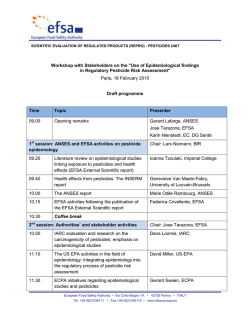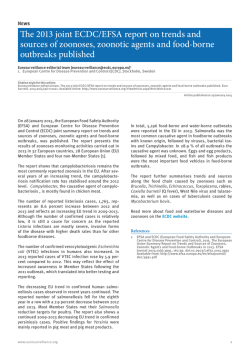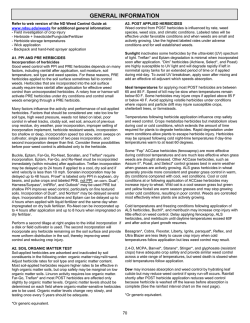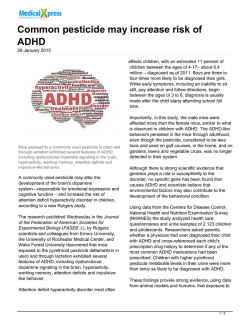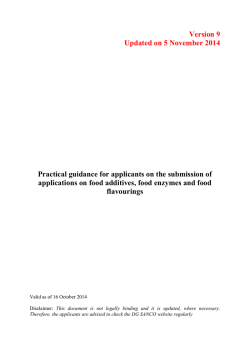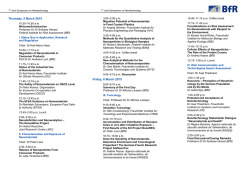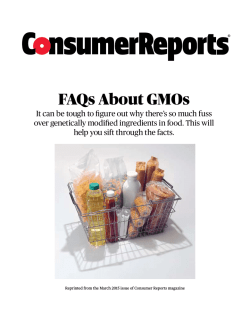
Press release in pdf
PRESS RELEASE Brussels, 12-11-2015 Tel: +32 (0)496392930 Info: Angeliki Lysimachou [email protected] EFSA’s (un-)scientific opinion: glyphosate not a carcinogen PAN Europe is extremely disappointed with today’s European Food Safety Authority (EFSA) opinion concluding that glyphosate is not classified as a human carcinogen. Instead of doing an independent assessment on the pesticide, EFSA’s work is a copy of the German Government agency BfR’s assessment and the pesticide industry dossier compiled by the Glyphosate Task Force, hiding and misinterpreting the tumour incidences from experimental studies. This opens the road to the re-authorization of this dangerous pesticide in the EU, which was recently classified as “probable human carcinogen” by the International Agency for Research on Cancer (IARC) of the World Health Organization1. EFSA published today its conclusion on glyphosate and found it “unlikely to pose a carcinogenic hazard to humans”. This contradicts the previous assessment from 17 international experts of IARC concluding glyphosate is a “probable carcinogen” due to limited scientific evidence of carcinogenicity in humans, sufficient evidence of carcinogenicity in experimental animals and evidence on genotoxicity. The contradiction between IARC’s report and EU Authorities on glyphosate classification was examined by toxicologist Dr Peter Clausing (PAN Germany) who detected major flaws in the assessment of glyphosate by German BfR2. In his critical review, Dr Clausing highlights that even without considering independent academic literature, significant tumour incidences were found in five mice studies and at least two rat studies of the regulatory animal experiments produced by the industry. Unlike IARC’s assessment and against OECD rules, BfR and now EFSA, consider these tumour incidences as irrelevant to glyphosate exposure, by: i) cheating on the use of the “control” groups 3 , ii) overlooking statistically significant results, iii) considering cancer incidences from human epidemiology studies as inconsistent and iv) totally dismissing genotoxicity data as nonrelevant (due to the ‘lack’ of carcinogenic effects!). PAN Europe’s Chemicals Officer Hans Muilerman comments “EFSA’s opinion violates the precautionary principle; BfR and EFSA only conclude to adverse effects in case of overwhelming evidence; in case of doubt they give the advantage of the doubt to industry instead of giving priority to the protection of human health and the environment”. Furthermore, environmental toxicologist Dr. Angeliki Lysimachou highlights “European citizens trust the Commission that if a chemical is ‘probably carcinogenic’, it will be banned from agriculture and won’t end up as residues in food and the environment. It is unacceptable that EFSA decided to dismiss the scientific evidence showing 1 http://www.iarc.fr/en/media-centre/iarcnews/pdf/MonographVolume112.pdf http://www.pan-germany.org/download/PAN_Germany_Addendum_analysis_09112015.pdf 3 In animal experiments, the exposed groups are always compared to a control (unexposed) group. In the industry studies some of the unexposed control groups did not develop tumours. But, instead of using these data for a control, the RMS and now EFSA have selected to compare their carcinogenicity data of exposed animals with historical controls (from different laboratories and rodent strains) of animals that have tumours. In this way the tumours in the glyphosate exposure groups appear “statistically insignificant”. Pesticide Action Network Europe - Rue de la Pépinière 1 - 1000 Brussels - Belgium +32 (0)496 39 29 30 www.pan-europe.info 2 the potential of glyphosate to cause cancer and genotoxicity, putting at risk human health and the environment”. Pesticide Action Network Europe - Rue de la Pépinière 1 - 1000 Brussels - Belgium +32 (0)496 39 29 30 www.pan-europe.info
© Copyright 2026
